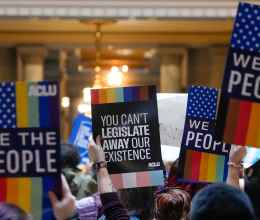
Detainer Request Resolution Adopted in 2013 has Saved Tax Dollars, Improved Police Relations
MIAMI – The Southern Poverty Law Center (SPLC), the American Civil Liberties Union of Florida, Kurzban, Kurzban, Weinger, Tetzeli & Pratt, P.A., numerous legal scholars, and local advocacy groups today urged the Miami-Dade Board of County Commissioners to uphold a county resolution that has saved millions of tax dollars and improved community relations with police by not requiring officers to detain people for immigration authorities in county jails. The resolution’s future has been imperiled by Mayor Carlos Giménez’s Jan. 26 directive that the county again hold immigrants for the federal government at taxpayer expense.
In a letter to the commissioners, the groups explained that, contrary to the mayor’s recent directive, the county does not face any imminent threats to federal funds by keeping the policy. Although President Trump recently issued an executive order that threatens to withhold federal funds from localities that refuse to share information with federal immigration authorities, that order does not extend to Miami-Dade, which prohibits only the jailing of immigrants at county expense. Any future attempt by the president to revoke funding from states and localities is subject to important constitutional limitations, the letter explains.
If Miami-Dade returns to its old practice of holding people after their criminal detention ends, it will stand to lose hundreds of thousands of dollars – or more – annually, according to the letter. According to a memo issued by the mayor in 2013, the county spent more than $624,000 to honor immigration detainers – requests from federal authorities to not release a person from jail – the year before the county stopped honoring them. The figure far exceeds the mayor’s recent statement that a policy of honoring detainers will cost the county only about $50,000 a year.
The letter also describes how the county would be vulnerable to lawsuits if its jails held people after the criminal law basis for their detention has ended. Law enforcement agencies have repeatedly been held liable for unconstitutionally detaining people in response to such requests.
Other U.S. cities have vowed to continue to keep local law enforcement separate from immigration enforcement, including Boston, Chicago, Cincinnati, Denver, San Francisco, Syracuse, New York, and Washington, D.C.
“Forcing local law officers to become immigration agents will only undermine trust between the police and immigrants, which makes our communities less safe as fear prevents immigrants from reporting crime,” said Naomi Tsu, SPLC deputy legal director. “Miami-Dade Mayor Carlos Giménez needs to do what’s best for his constituents instead of giving into an administration that has demonstrated it is only adept at throwing our nation’s immigration policy into chaos.”
Miami-Dade’s detainer policy, which was adopted unanimously by the county commissioners in 2013 and took effect in 2014, has come under threat as a result of the mayor’s Jan. 26 directive that the county honor all immigration detainer requests. President Trump’s executive order was issued a day earlier. The board of county commissioners has scheduled a special hearing on Feb. 17 to discuss the detainer policy.
“The policy approved by the county commission in December 2013 was first and foremost about protecting immigrant families,” said Jonathan Fried, executive director of We Count!, an organization that advocates for the rights of immigrants and farmworkers. “Mayor Giménez’s recent capitulation to the Trump administration’s threats will increase fear and human rights violations in our community. Moreover, it is unjustified, unnecessary, and puts the county at risk.”
The letter notes there are “significant restrictions” on the federal government’s ability to cut Miami-Dade County’s funds in the future. An administration cannot impose new funding conditions on the county without first giving it a chance to decide whether to forgo federal funds or change policies.
Since adopting the policy of declining to honor detainers, the relationship between the immigrant community and law enforcement has improved, according to the letter, which notes that using local law enforcement to enforce federal immigration law generates distrust of police in immigrant communities and discourages reporting of crime. It also highlights a study that found counties with anti-detainer policies have lower crime rates than similar counties without them.
Numerous legal scholars and advocacy organizations signed the letter, including professors that teach constitutional and immigration law. Groups that signed the letter include ACLU of Florida; American Friends Service Committee; Americans for Immigrant Justice; AILA South Florida Chapter; Advocacy Partners Team, Inc.; Catalyst Miami; Catholic Legal Services; Centro Campesino Farmworker Center; Community Justice Project; Dream Defenders; Emerge USA; FANM/Haitian Women of Miami; Florida Association of Criminal Defense Lawyers, Miami Chapter; Florida Immigrant Coalition; Immigration Law & Litigation Group; Kurzban, Kurzban, Weinger, Tetzeli & Pratt, P.A.; LatinoJustice PRLDEF; Miami-Dade Progressive Caucus; Miami Workers Center; Mijente; National Day Laborer Organizing Network; National Lawyers Guild, South Florida Chapter; New Florida Majority; Power U Center for Social Change; Rise Up Florida!; SEIU Florida; SLAY Our Vote; South Florida Interfaith Worker Justice; Southern Poverty Law Center; University of Miami School of Law’s Immigration Clinic; United Families United We Dream; Veterans Bar Association; We Count!; and We Belong Together.



